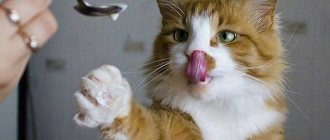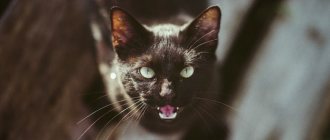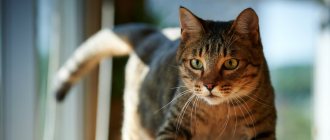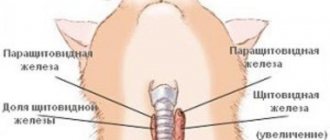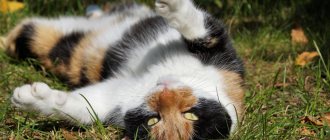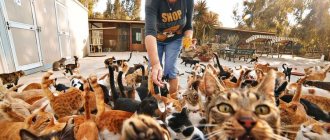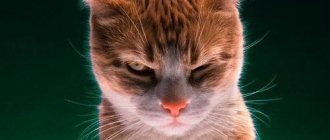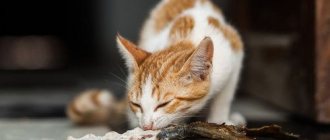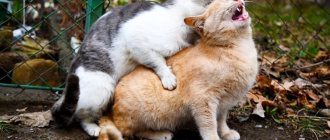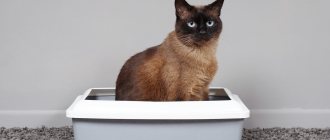Many cat owners find that their cat is always asking for food even if it is fed the right amount throughout the day, and there could be several reasons why they do this. This behavior, or rather a condition known as polyphagia, can be frustrating for the owner because, frankly, it's not a natural behavior when you think about cats in the wild: they hunt, eat, clean, then sleep and start all over again.
They don't constantly hunt for food, so why all the begging? In this article, we'll look at all the possible reasons why your cat is always begging for food, even when she's finished eating, and sometimes even when there's still food in her bowl.
No. 1 Kitty asks for a treat
If you often pamper your purr with treats, then he may well begin to “beg” even if he has just eaten. Cats know very well where everything is, so if your pet looks expressively at the shelf where his favorite treat is located, it means that he is not so much hungry as he wants to “treat himself” to something tasty.
The tendency to be overweight is determined by breed
We will not deny that some breeds are more prone to obesity than others. However, this is not a verdict, and everything is again in the hands of the owner. The cat gets fat not only because she is British, but also because she gets too much food. By eliminating the cause, you will get rid of the effect.
Please note that reversing obesity is much easier at the initial stage. If you see that your cat’s sides are rounded, and the spine and ribs are hard to feel under a layer of fat, you should reconsider its diet without waiting for it to turn into a ball.
No. 2 The cat has eaten his portion, but asks for more
This problem often concerns castrated animals, which, due to hormonal changes, actually have an increased appetite. This is usually a temporary phenomenon, and it goes away as soon as the cat’s body adapts to its new state.
If your tailed pet is overweight and asks for more, this indicates that the cat has a distended stomach and needs more food to be satisfied. In this case, you will need the help of a veterinarian, since it is not so easy to put an overweight cat on a diet.
Situation 5: a pregnant cat constantly asks for food
“Ever since my cat got pregnant, she has been eating a lot. I understand that pregnant women eat more. But how much more? How to calculate the norm?
The situation when a nursing cat constantly asks for food or a pregnant cat is always hungry is quite normal. During this period, all her juices are sucked by the kittens (either in the womb or when they drink their mother's milk). Therefore, pregnant and lactating cats are not limited in food - they themselves regulate the amount they eat.
No. 3 The cat eats quickly, but then asks for more
This behavior can be detected in a cat that has been starving for a long time. Greed for food and eating it without even chewing are signs that may suggest the sad past of a pet who has known a hungry life on the street.
Here the hunger has an exclusively psychological reason - the cat is afraid that the food will run out and the next one will not be given. If so, you need to eat for future use.
Situation 1: a hungry cat does not eat up natural food; previously drying was always available
My cat, until she was 2 years old, ate only dry food; it was always available. Now we have switched her to natural food twice a day and cannot feed her: she constantly asks for food throughout the day. Why does a cat always want to eat?
Over the course of 2 years, the cat got used to a diet where food was available all the time. Now she is limited to two meals, which is unusual for her and can even cause stress. Naturally, it is inappropriate to keep natural food available at all times; such nutrition requires 2-3 meals a day. However, the cat needs time to readjust. This takes from 1 to 3 months. At this time, if possible, you can divide the daily portion into 3 meals instead of two, and then, when the cat gets used to this regimen, remove the daily meal, again dividing it between breakfast and dinner. If it is not possible to feed three times a day, you will just have to wait until the body readjusts.
No. 4 Parasites as a cause of increased appetite
Does your pet demand food even though it just recently ate? This may be a signal that the cat has worms. If he is still not gaining weight, then you should consult a veterinarian about anthelmintic therapy.
Of course, there are many methods for identifying parasites, but a change in appetite is a sign that should not be ignored.
Causes of constant hunger
A constant feeling of hunger in animals is called polyphagia.
With this phenomenon, pets experience an increased appetite and a constant demand for supplements. Why is your furry friend hungry? Let's look at the main reasons why a cat asks for food all the time:
- Taking medications to increase appetite.
- Cheap, low-quality food.
- The presence of parasites in a cat can be a significant explanation for why your pet requires more food.
- As a rule, pets over 10 years of age have a higher interest in food than younger individuals. For this reason, a cat's constant feeling of hunger may be due to its age.
- If, in addition to increased appetite, the animal experiences rapid weight loss, most likely we are talking about the presence of a disease of the gastrointestinal tract .
- Having high blood sugar.
If, in addition to your pet's appetite for food, there are other warning signs, such as weight loss or vomiting after eating, you should seek help from an experienced veterinarian.
© shutterstock
No. 5 The cat has an increased appetite, but is losing weight
If your cat eats a lot but is losing weight, there is cause for concern. A pet’s increased appetite may indicate serious diseases, the most common of which are diabetes, hyperthyroidism, and even malignant tumors.
To find out what is happening to the cat, you must visit the veterinarian and do all the necessary tests. After receiving the results, the situation will certainly become clearer.
Well, we hope that your pet has a healthy appetite and loves to eat delicious food simply because food gives him pleasure!
Situation 7: the cat asks for food, but when you give it, it doesn’t eat
“The cat doesn’t eat, but asks if it hasn’t been given yet. That is, he goes around asking, but as soon as you put food on the plate, he sniffs it, spins around and leaves. But still, he eats twice a day on schedule.”
If the cat is hungry, but does not eat when you offer it, this means that either it does not want to eat, or it was given the wrong thing. The second situation is again a consequence of the fact that the cat doesn’t really want to eat: it is overfed and is eating too much food. And requests for food are nothing more than a sporting interest, a kind of hunting. If a cat is really hungry, she will eat the food that is offered to her (of course, if this food suits her). If the animal receives feeding 2 times a day, you should not give additional food between meals.
When to worry about a cat that isn't gaining weight?
A cat's thinness is a cause for concern if it is accompanied by other symptoms. Symptoms that should get on your nerves. For example, hair loss, dull coat, vomiting, extreme thirst, etc.
It is important to discuss this with your veterinarian to properly diagnose the causes. Moreover, the most common are:
- diabetes,
- infections of the gums or teeth,
- gases,
- hairball in the intestines, etc.
Digestive parasitism is also one of the most common pathological reasons underlying why a cat does not gain weight. In fact, skinny cats that eat a lot often end up with parasites. Most often by intestinal worms (roundworms, tapeworms, etc.), which deprive them of vital nutrients. Therefore, it is very important to deworm cats every month until they are 6 months old. And then every 3 months with a universal degwormer.
It can also be kidney failure caused by poor hydration, which if not treated properly can develop into a much more serious chronic kidney disease.
What is this phenomenon?
If a cat constantly asks for food, then this change in eating behavior is called polyphagia. This is a pathological condition caused by:
- gluttony and stretching of the stomach walls;
- lack of nutrients during the active growth of a young animal;
- the body's reaction to medications;
- stress or prolonged feeling of discomfort;
- cold season;
- decreased metabolism in old age.
- I’m hungry!..
Polyphagia can develop at any age. If your cat has been eating a lot lately, although this was unusual for him before, the reason should be identified as soon as possible.
Attention! Stressful situations and prolonged lack of appetite subsequently provoke polyphagia in cats. After a hunger strike, they try to make up for the lack of nutrients without feeling full.
How to prevent and control weight loss in cats?
To prevent weight loss in cats, it is recommended to periodically check their health. It is also advisable to weigh it at least once every 3 months. This makes it possible to detect unnoticed weight loss and treat any diseases in a timely manner. To stay healthy, a cat needs between 50 and 70 calories per kilogram. This is equivalent to an average of 200g of commercial food per 3kg cat. For pregnant or lactating cats, this energy contribution should be increased upward. But also for kittens and cats during the mating season. Great importance should also be paid to the nutritional balance of the feline. Simply put, a complete cat food consists of:
- 40% carbohydrates, mostly slow sugars
- 40% protein, mostly meat and fish
- 20% fat, fiber, mineral salts, vitamins and water
Pet owners can take inspiration from the Mediterranean diet. Lots of vegetables, meat, often fish. It's all seasoned with spices that will stimulate your cat's appetite and senses.
Dominance of other cats
If you have more than one cat, a hierarchy inevitably builds up in the cat community: someone considers himself more important, which inevitably causes conflict with varying degrees of mutual aggression.
A cat that is afraid of letting its guard down and being ambushed may want to avoid visiting the cat cafeteria. And considering that in the wild, cats are able to starve for several days without harm to the body, such voluntary abstinence can last quite a long time.
If you have a lot of cats, make sure there are several feeding areas in the house and arrange them so that your pets feel safe while eating.
When to start sounding the alarm?
The cat constantly feels a feeling of hunger and during the development of dangerous syndromes and diseases. One of the main dangerous reasons is impaired absorption of nutrients. This may be a congenital syndrome or a sign of a serious illness:
- inflammatory process in the intestines;
- bowel cancer;
- exocrine insufficiency.
With these diseases, poor absorption of food occurs and the feeling of hunger increases. The animal suddenly loses weight.
